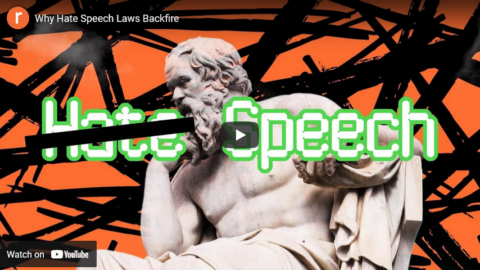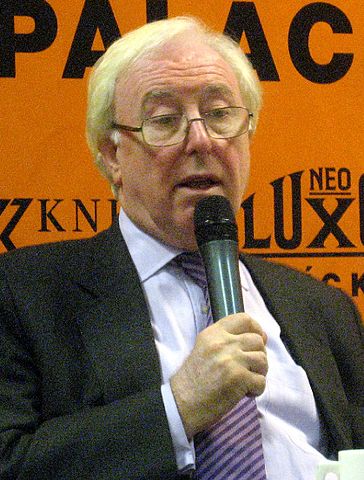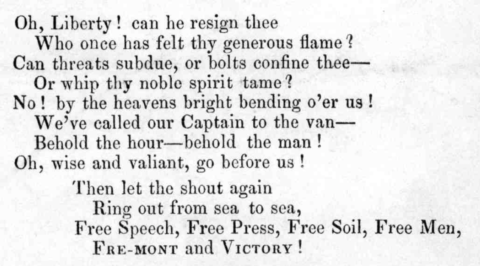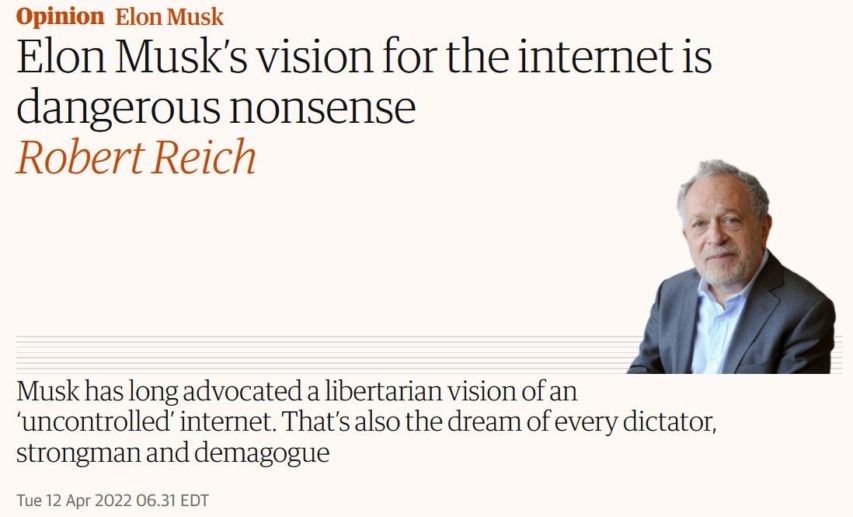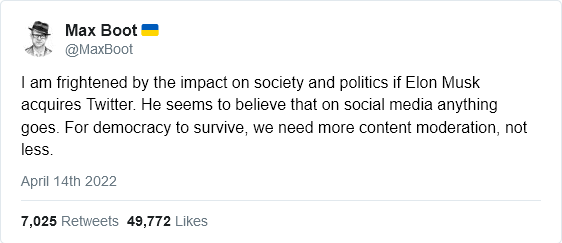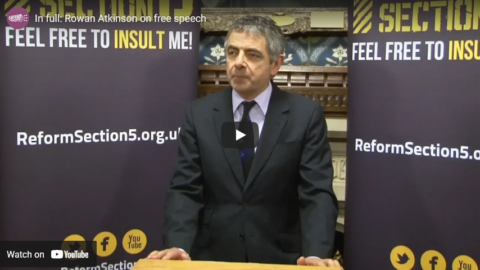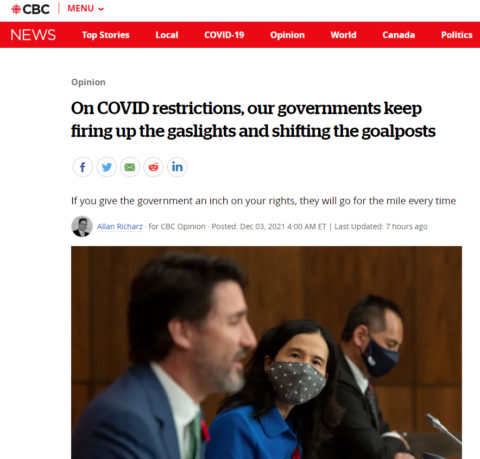ReasonTV
Published 26 Feb 2022Here’s a brutal irony about regulating hate speech: Such laws often end up hurting the very people they are supposed to protect.
——————
Follow us on Twitter: https://twitter.com/reasonReason is the planet’s leading source of news, politics, and culture from a libertarian perspective. Go to reason.com for a point of view you won’t get from legacy media and old left-right opinion magazines.
—————-
That’s one of the central lessons in Jacob Mchangama’s important new book, Free Speech: A History from Socrates to Social Media. Mchangama heads up the Danish think tank Justitia. He’s worried about a proposal that would make hate speech a crime under European Union (EU) law and give bureaucrats in Brussels sweeping powers to prosecute people spewing venom at religious and ethnic minorities, members of the LGBT+ community, women, and others.Europe’s history with such laws argues against them. In the 1920s, Germany’s Weimar Republic strictly regulated the press and invoked emergency powers to crack down on Nazi speech. It censored and prosecuted the editor of the anti-Semitic Nazi paper Der Stürmer, Julius Streicher, who used his trial as a platform for spreading his views and his imprisonment as a way of turning himself into a martyr and his cause into a crusade. When the Nazis took power in the early ’30s, Mchangama stresses, they expanded existing laws and precedents to shut down dissent and freedom of assembly.
Contemporary scholarship suggests that there can be a “backlash effect” when governments shut down speech, leading otherwise moderate people to embrace fringe beliefs. Mchangama points to a 2017 study published in the European Journal of Political Research that concluded extremism in Western Europe was fueled in part by “extensive public repression of radical right actors and opinions.”
In 1965, the United Kingdom passed a law banning “incitement to racial hatred,” but one of the very first people prosecuted under it was a black Briton who called whites “vicious and nasty people” in a speech. More recently, Mchangama notes that radical feminists in England “have been charged with offending LGBT+ people because they insist there are biological differences between the sexes. In France, ‘an LGBT+ rights organization was fined for calling an opponent of same-sex marriage a ‘homophobe.'”
“Once the principle of free speech is abandoned,” warns Mchangama, “any minority can end up being targeted rather than protected by laws against hatred and offense.”
That’s what happened in Canada in the 1990s after the Supreme Court there ruled that words and images that “degrade” women should be banned. The decision was based in part on the legal theories of feminist author Andrea Dworkin, whose books on why pornography should be banned were briefly seized by Canadian customs agents under the laws she helped to inspire.
First Amendment rights are still popular in the United States, with 91 percent of us in a recent survey agreeing that “protecting free speech is an important part of American democracy.” But 60 percent of us also said that the government should prohibit people from sharing a racist or bigoted idea.
Hearing hateful words and ideas outrages and discomforts most of us, but Mchangama’s history of free speech underscores that state suppression can grant those words and ideas more power and influence. And that the best antidote to hate in a free and open society is not to hide from it but to openly—and persuasively—confront it.
Listen to my Reason Interview podcast with Jacob Mchangama at https://reason.com/podcast/2022/02/16….
Written by Nick Gillespie. Edited by Regan Taylor.
June 19, 2022
Why Hate Speech Laws Backfire
June 8, 2022
With the ACLU no longer fit for purpose, FIRE steps up to protect freedom of speech on and off the campus
Matt Taibbi talks to Nico Perrino about the Foundation for Individual Rights in Education (FIRE) moving beyond protecting free speech for university students to protecting those rights for all Americans:
After years of planning, the Foundation for Individual Rights in Education, better known as FIRE, announced a major expansion Monday, moving “beyond college campuses to protect free speech — for all Americans”.
FIRE was the brainchild of University of Pennsylvania history professor Alan Charles Kors and Boston civil liberties lawyer Harvey A. Silverglate, who co-authored the 1999 book, The Shadow University: The Betrayal of Liberty on America’s Campuses. To the modern reader the book reads like a collection of eccentric cases of students and teachers caught up in speech code issues, most (but not all) being conservative.
To take just one of countless nut-bar examples, Kors and Silverglate told the story of a professor in San Bernardino reprimanded for violating sexual harassment policies because, among other things, “he assigns provocative essays such as Jonathan Swift’s ‘A Modest Proposal'”, as the court case later put it. This was apparently the “cannibalism” portion of the accusation that he delved into such subjects as “obscenity, cannibalism, and consensual sex with children”.
The book triggered such an overwhelming number of responses from other faculty members and students that the pair decided to set up an organization to defend people who found themselves in tricky speech controversies on campuses. They soon found they had plenty of work and, by 2022, enough of a mandate to expand beyond colleges and universities into America at large. According to FIRE CEO Greg Lukianoff, as quoted in a Politico story, the group has already raised over $28 million toward a $75 million “litigation, opinion research and public education campaign aimed at boosting and solidifying support for free-speech values”.
As noted in another story I put out today, FIRE will be doing a lot of stepping into a role semi-vacated by the American Civil Liberties Union. I spoke with Nico Perrino of FIRE, producer and co-director of the excellent documentary about former ACLU chief Ira Glasser (see review here), to ask what the expansion would entail …
May 13, 2022
“How do they resist the logic of O’Sullivan’s Law?”
In The Critic, Ben Sixsmith considers the oddities of organizations explicitly founded to advance certain goals who steadily morph out of recognition to the point they appear to be working against their original mission:
In 1989, John O’Sullivan of National Review coined O’Sullivan’s Law: “all organisations that are not actually right-wing will over time become left-wing.” Countless examples spring into the mind like toast. Is the Church of England a religious institution or a Lib Dem think tank with some eccentric uniforms? Of course religion and politics are going to intersect, but when archbishops start opining on Brexit you have to wonder. Is the Amnesty International which is now so heavily concerned with trans rights and abortion rights the same Amnesty International that used to defend political prisoners, or a kind of imitator? Both, I guess.
But how inevitable is O’Sullivan’s Law? In recent times, some institutions have avoided drifting leftwards. Substack, a platform for writers and podcasters, have raised progressive hackles by refusing to exclude alleged transphobes. “As we face growing pressure to censor content published on Substack that to some seems dubious or objectionable,” its founders have boldly said, “our answer remains the same: we make decisions based on principles not PR, we will defend free expression, and we will stick to our hands-off approach to content moderation.” Elsewhere, Elon Musk has attempted to purchase Twitter in explicit opposition to its censorious policies.
Clearly, and understandably, neither institution aims to be “right-wing” (except inasmuch as anything which is not explicitly progressive earns the label). Nor do many others. How do they resist the logic of O’Sullivan’s Law?
As a grubby hack I have no more experience running large organisations than I do making rockets and curing heart disease, but I have a couple of modest suggestions. First, the leaders of an institution should ensure that its values are not open-ended but contextually specific. You can be “inclusive” in the concrete sense that anyone can be included among applicants, for example. But if “inclusivity” is just a vague ideal, then the demands made in its name are liable to expand until your institution is no more than an excuse for an HR department.
Second, such leaders should surround themselves with people who admire the essential ethos of the institution. Conquest’s Second Law (named after Robert, the historian) states, “The behaviour of an organisation can best be predicted by assuming it to be controlled by a secret cabal of its enemies.” (Conquest pointed out that this can be literally true, such as when a bunch of smart young lads from good families graduated from Cambridge to the Secret Intelligence Services and started feeding information to the Soviets.) You can disagree on 99 out of 100 things but you have to share core premises. If I start a panda preservation society, for example, it makes no sense to give a management position to someone who thinks conserving endangered species is a waste of money and pandas are faintly ridiculous creatures. Their qualifications and experience are immaterial.
Third, an institution should not seek scale at the expense of integrity. This is especially the case with non-profit institutions. Expansion — and all the jolly business of fundraising and management that comes with it — can emphasise the means of its existence over its ends. This then makes it vulnerable to redirection.
Fourthly, and finally, any leader of an institution (especially a business) should avoid the temptation to use progressive cultural causes as a means of “woke-washing” themselves. You know what I mean. It seems like an easier way of getting moral status than, say, treating workers well. But (and I will phrase this in cynical terms because self-interest means more to us than ethics) we would do well to remember that demands can escalate. Workers can be satisfied. Professional activists? Not so much.
May 2, 2022
Free speech is different from those days when people wore tricorn hats and buckles on their shoes
At least, those who have a strong aversion to Elon Musk allowing free speech on Twitter believe things were very different back in the olden days and we can’t allow just anyone to say whatever they want in the current year, else chaos descend:
Recently, Max Boot said that social media has to be handled differently than media did in the past, because in the 1980s we only had three TV networks and we mostly communicated ideas by chiseling pictures into rocks and firing them at neighboring towns with a trebuchet. Or, I don’t know, something like that, which I talked about here.
Now a Time magazine correspondent named Charlotte Alter — more about her in a moment — says the same thing, but with different periodization:
But “free speech” in the 21st century means something very different than it did in the 18th, when the Founders enshrined it in the Constitution. The right to say what you want without being imprisoned is not the same as the right to broadcast disinformation to millions of people on a corporate platform. This nuance seems to be lost on some techno-wizards who see any restriction as the enemy of innovation.
That’s all she says about speech in the 18th century, so it beats the shit out of me what this comparison is supposed to mean, and I kind of suspect that it beats the shit out of her, too. But again, Alter’s it was different back then is no better than the last one that got on my nerves. The idea that the conflict over information now is wholly different than the conflict over information then is just the usual nonsense.
First, the Founders had just fought a revolutionary war that was born from print culture, from an explosion of written sources that were widely shared and widely contested. Someone like the Massachusetts colonial official Thomas Hutchinson absolutely thought, and said very clearly, that he was engaged in a contest with idiots who were spreading disinformation in print. I’ve already written about this, too.
Again, here’s how the historian Bernard Bailyn sums up Hutchinson’s view of the idiots and demagogues (like John Adams) that he was arguing with in the decade before the Revolution, and tell me if it sounds the slightest bit different than the current “misinformation” discourse from our own Thomas Hutchinsons: “The common run of the people, lacking the necessary education, leisure, and economic independence to make an impartial assessment of public problems, were mercurial playthings of leaders who could profit by exciting their fears.” I’m not sure if Hutchinson was Max Boot living in a past life or David French living in a past life, but I take this as clear evidence that at least one of them did, in fact, have past lives, and that they’ve been the same elitist whiner every time the wheel of existence has turned.
Second, all of the things the Founders enshrined in the Constitution were the products of a fierce and sustained rhetorical contest in print, as Federalists and Anti-Federalists — writing pseudonymously, like some asshole on Twitter — fought over the likely practical effects of their ideological differences. Brutus and Cato thought Publius was spreading disinformation, and Publius returned the favor. Newspapers all over the country reprinted their exchanges; 18th century political discourse was wide open, it was broadly disseminated, and it ran hot. If you want to argue that “free speech” in the 21st century means something different than it meant in the 18th, you have to say how. People argued then. In print. And then the arguments went out all over the place. I Swear.
April 25, 2022
April 21, 2022
April 6, 2022
Proposed new Canadian censorship rules will ███████ the ████████ unless we ████ ██
In The Line, Josh Dehaas waves off accusations against Trudeau while also highlighting just how censorious his governments proposed internet bill can be to freedom of expression online:
Comparisons of our prime minister to a dictator are self-evidently ridiculous. But the Russian example is still a case study in the harms of governments having too much power over the flow of information and ideas in a society. Trudeau is no dictator but he does helm a government in which overreach is becoming a frequent and habitual complaint. And one such area in which this government’s more illiberal tendencies are beginning to show is in the realm of media regulation. Despite pushback from groups like the Canadian Constitution Foundation and the Canadian Civil Liberties Association, the Trudeau government seems determined to press ahead with laws to control what you read, write, watch and hear online.
The Liberals have long promised three bills aimed at countering three ostensible problems with online speech. The first bill aims to correct the problem of too few people choosing CanCon, by manipulating what you watch and listen to on platforms like Netflix and Spotify. The second bill would address the problem of advertisers ditching legacy newspapers for Facebook and Google. (Apparently the $600 million bailout was not enough.) The third bill, aimed at so-called “online harms”, would try to prevent people from saying hateful things to each other on social media.
This “online harms” bill is the scariest. Recently rebranded as the “online safety” bill, it’s apparently getting an overhaul from an expert panel and will be re-tabled in a few months. Let’s hope it never comes back. A version tabled last year, Bill C-36, would have created a tribunal wherein people found guilty of “online hate speech” could have been forced to pay up to $20,000 to their accusers, plus up to $50,000 in fines. In some cases, the accusers would be allowed to remain anonymous. Unlike the rarely used hate speech provisions in the Criminal Code, the tribunal would have only needed to find that the speech was hateful on a balance of probabilities, as opposed to the higher standard of beyond a reasonable doubt.
Even more ominously, C-36 would have allowed judges presented with “reasonable grounds” that a person might commit “an offence motivated by bias, prejudice or hate” in the future to threaten the would-be hater with up to 12 months in prison.
I don’t deny that hate speech can lead to harm. But do we really want government and judges deciding what crosses the line? One person’s hateful tweet is another person’s harsh but valuable contribution. Think J.K. Rowling. Think Dave Chapelle. Or think of the University of Toronto student who wrote recently that it was hateful for a professor to show an unflattering cartoon about Iranian Supreme Leader Ali Khamenei, a man whose theocracy executes people for being gay.
Proponents of the bill will tell you that it only applies to the most extreme forms of vilification, but at the end of the day it means government-appointees deciding who gets to say what in an environment that financially incentivizes the aggrieved. People will self-censor even more than they already do.
March 23, 2022
The New York Times and the “world’s dullest editorial”
Matt Taibbi explains why a milquetoast New York Times editorial got such immense blowback from other legacy media outlets:
The New York Times ran a tepid house editorial in favor of free speech last week. A sober reaction:
One might think running botched WMD reports that got us into the Iraq war or getting a Pulitzer for lauding Stalin’s liquidation of five million kulaks might have constituted worse days — who knew? Pundits, academics, and politicians across the cultural mainstream seemed to agree with Watson, plunging into a days-long freakout over a meh editorial that shows little sign of abating.
“Appalling,” barked J-school professor Jeff Jarvis. “By the time the Times finally realizes what side it’s on, it may be too late,” screeched Philadelphia Inquirer columnist Will Bunch. “The board should retract and resign,” said journalist and former Planet Money of NPR fame founder Adam Davidson. “Toxic, brain-deadening bothsidesism,” railed Dan Froomkin of Press Watch, who went on to demand a retraction and a “mass resignation”. The aforementioned Watson agreed, saying “the NYT should retract this insanity, and replace the entire editorial board.” Not terribly relevant, but amusing still, was the reaction of actor George Takei, who said, “It’s like Bill Maher is now on the New York Times Editorial board.”
The main objection of most of the pilers-on involved the lede of the Times piece, which really was a maladroit piece of writing:
For all the tolerance and enlightenment that modern society claims, Americans are losing hold of a fundamental right as citizens of a free country: the right to speak their minds and voice their opinions in public without fear of being shamed or shunned.
There’s obviously no legal right in America to voice an opinion without being criticized, so this line is indeed an error and an embarrassing one, for a labored-over first line of a major New York Times editorial. On the other hand, a lot of great liberal thinkers decried shaming tactics as utterly opposite to the spirit of free speech, with John Stuart Mill’s warning of a “social tyranny more formidable than many kinds of political oppression” being just one example. So, while the Times technically screwed up, cheering shaming and shunning as normal and healthy elements of life in free societies is a pretty weird gotcha. In any case, this bollocksed lede introduced a piece that had been in the works for a while, and came complete with a poll the paper commissioned in conjunction with Siena College.
[…]
This Times editorial is watered down almost the level of a public service announcement written for the Cartoon Network, or maybe a fortune cookie (“Free speech is a process, not a destination. Winning numbers 4, 9, 11, 32, 46 …”). It made the Harper’s letter read like a bin Laden fatwa, but it’s somehow arousing a bigger panic. Its critics view the mention of Republican legislative bans in conjunction with canceling as a monstrous affront, a felony case of both-sidesism. Obviously any implication that there’s any moral comparison between Republicans banning speech by law and Democrats doing it by way of informal backroom deals with unaccountable tech monopolies is unacceptable. Beyond that now, much of the commentariat seems to believe the op-ed page has outlived its usefulness unless it’s engaged in fulsome denunciations of correct targets
February 25, 2022
QotD: The lure of the forbidden knowledge
When we as academics avoid those uncomfortable questions, we unwittingly invite others to answer them for us. When activists try to suppress rather than debate speech they find loathsome, they should know they are adding to its mystique.
Forbidden ideas have an appeal that orthodoxy never does — just ask Martin Luther. In fact, the parallels between the rise of the alt-right and the Reformation are interesting. In Luther’s world the printing press had recently created new and difficult to control ways for people to share subversive ideas. Early forms of capitalism led to the rise of new social classes and fueled resentment against traditional elites and traditional forms of authority. There were even early forms of the meme. Long before Pepe the Frog was co-opted by the alt-right, drawing donkey ears on images of priests was a way of provoking the powerful.
It’s surely the case that some of the speech that activists and university administrators seek to suppress poses a much more direct threat to real people than does a debate about supply side economics or evolution, but it’s worth remembering that to the Church, the Lutheran heresy was a real threat too. It posed a mortal danger to the eternal souls of people who were deceived by its falsehoods and rejected orthodoxy. I doubt that the Inquisitors felt any more qualms about deplatforming Lutheran heretics than did the activists at Middlebury.
As the Church learned, simply suppressing heresy cannot guarantee that it will go away. If anything, meeting heretical speech with violence or disruption just adds to its allure, confirming in the minds of the already convinced that they are right and leading the fence sitters to take another, perhaps more sympathetic, look. Dismissing heretical speech because it falls into a category that is rejected by the orthodox is not that much more effective a strategy.
We can do a lot to keep things from getting to the sort of highly contentious encounters like the ones at Middlebury and Berkeley, just by addressing uncomfortable issues with evidence rather than just categorization in our courses. Next time you are tempted to sidestep contentious issues in your class or to dismiss a student’s question because it falls into a forbidden category, don’t.
In the long run we can’t win an argument by avoiding it.
Erik Gilbert, “Liberal Orthodoxy and the New Heresy”, Quillette, 2019-02-04.
February 13, 2022
January 29, 2022
Viewing with alarm — Substack is a place where “misinformation is allowed to flourish”
Matt Taibbi posts, appropriately, on Substack about demands by others to force Substack to censor writers and their content:
Substack is home to tens of thousands of writers and over a million paying subscribers, quadruple last year’s total of 250,000. The sites range from newsletters for comics enthusiasts to crypto news to recipe ideas. Like the Internet as a whole, it’s basically a catalogue of everything.
Still, panic campaigns in legacy press consistently focus on handfuls of sites, and with impressive dishonesty describe them as representative. I was particularly struck by a recent Mashable article that talked about a supposed “backlash” against Substack’s “growing collection of anti-trans writers”, which seemed to refer to Jesse Singal (who is no such thing) and Graham Linehan and — that’s it. Substack is actually home to more trans writers than any other outlet, but to the Scolding Class, that’s not the point. The company’s real crime is that it refuses to submit to pressure campaigns and strike off Wrongthinkers.
Substack is designed to be difficult to censor. Because content is sent by email, it’s not easy to pressure platforms to zap offending material. It doesn’t depend on advertisers, so you can’t lean on them, either. The only real pressure points are company executives like Hamish McKenzie and Chris Best, who are now regular targets of these ham-fisted campaigns demanding they discipline writers.
The latest presents Substack as a place where, as Mashable put it, “COVID misinformation is allowed to flourish”. The objections mainly center around Joseph Mercola, Alex Berenson, and Robert Malone. There are issues with the specific critiques of each, but those aren’t the point. Every one of these campaigns revolves around the same larger problem: would-be censors misunderstanding the basic calculus of the freedom of speech.
Even in a society with fairly robust protections, as ours once was, the most dangerous misinformation is always, without exception, official.
As the old joke from the Cold War had it, never believe any rumour until it’s been officially denied.
Censors have a fantasy that if they get rid of all the Berensons and Mercolas and Malones, and rein in people like Joe Rogan, that all the holdouts will suddenly rush to get vaccinated. The opposite is true. If you wipe out critics, people will immediately default to higher levels of suspicion. They will now be sure there’s something wrong with the vaccine. If you want to convince audiences, you have to allow everyone to talk, even the ones you disagree with. You have to make a better case. The Substack people, thank God, still get this, but the censor’s disease of thinking there are shortcuts to trust is spreading.
January 3, 2022
December 15, 2021
QotD: Suppressing intellectual heresy
Middlebury students acted to prevent Charles Murray from speaking on the relatively benign subject of the travails of the white working class because he had previously written work that some have categorized as racist. That label meant that they need not grapple with the substance of his earlier book, but it also meant that as a known heretic his subsequent work was likewise tainted.
The young people at Middlebury who shouted down Charles Murray and assaulted a faculty member who had tried to engage him in civil debate were, in effect, suppressing the ideas of a heretic. After all, a heretic’s ideas are too dangerous to be heard.
Dangerous ideas are, of course, interesting ideas, especially to young people. When we fail to address dangerous ideas in our courses, we add to their mystique. When activists shout down or assault heretical speakers they send two messages. The first and intended message is a display of righteous disapproval. The other, unintended message, is that there is something so menacing about the idea being expressed that it cannot simply be laughed off or even argued with, rather it cannot be allowed to be spoken.
Consider how that looks to someone who is starting to question the premises of the liberal orthodoxy on race, gender, diversity and so on. Why, our alt-right curious person might wonder, are there some ideas that are so laughably false that one need not even mount a counter argument (a flat earth or the financial benefits of college athletics), some ideas that are considered contentious but still open to debate (supply-side economics), and some ideas that are so outré that they can only be met with back turning, shouting, or by punches to the face?
Might it be, our waverer must wonder, that these people don’t want me to hear this idea because they don’t have a good answer to it?
Erik Gilbert, “Liberal Orthodoxy and the New Heresy”, Quillette, 2019-02-04.
December 4, 2021
Things I never expected to read on the CBC website — “…frantically firing up the gaslights and moving the goalposts on COVID restrictions and vaccinations”
Canada’s state broadcaster has been — as you would expect — a staunch supporter of every government initiative to limit free speech and the rights of Canadians in tackling the Wuhan Coronavirus pandemic. They’ve consistently portrayed any concerns or doubts about draconian government action as irrational, anti-science conspiracy theories and the people raising such concern as effectively “enemies of the people”. As such, I never expected to see anything like this CBC Opinion piece by Allan Richarz:
Listen closely and one might be able to discern the unmistakable sounds of our elected and unelected officials frantically firing up the gaslights and moving the goalposts on COVID restrictions and vaccinations.
It was a precipitous but inevitable shift from “two weeks to flatten the curve” to get the jab or lose your job, and unsurprisingly, there is still more to come.
Met the provincial vaccination targets? Great; but now it’s time for a booster. Ready for the “temporary” vaccine passport system to expire? Sorry, we need to extend it through spring; proving once again that if you give the government an inch on your rights, they will go for the mile every time.
Less than a year ago, government and public health officials touted vaccination as a panacea to end the pandemic. It’s safe, effective and will allow the country to put COVID behind us, we were told. To that end, citizens were encouraged, prodded and eventually threatened to get their shots, with holdouts demonized by politicians at all levels. Yet, in Ontario, even as the province exceeded by weeks its vaccination and case number targets of the government’s phased reopening plan, citizens were offered only breadcrumbs in return: moving up Phase 3 reopening by just a few days, with no plans at the time for a complete reopening.
And now, with new case numbers in Ontario essentially split evenly between the unvaccinated and fully vaccinated and questions about waning vaccine efficacy, the goalposts shift again with the rollout of booster shots elsewhere in the country and calls for expanded eligibility.
One does not need to look hard to guess what the next step will be across Canada. In Israel and France, the definition of fully vaccinated was changed to include boosters; those six months out from their second dose, or first booster, are now considered unvaccinated, and their vaccine passport privileges suspended.
H/T to SDA for the link.
November 28, 2021
Cambridge University “uncancels” Jordan Peterson
Arif Ahmed explains why Cambridge originally “cancelled” Jordan Peterson and recently how that cancellation was overcome:

Jordan Peterson speaking at an event in Dallas, Texas on 15 June, 2018.
Detail of a photo by Gage Skidmore via Wikimedia Commons.
The Peterson cancellation was one of several troubling events at that time which spurred some of us at Cambridge to fight back. Not only because we wanted Peterson to be able to visit Cambridge, but also because we wanted anyone whom any academic saw fit to invite to be able to visit. It should never have been up to the university authorities to dictate what academics can discuss or whom we can discuss it with.
And so we began a long and at first lonely campaign to realign this ancient and great institution with freedom of speech, freedom of conscience and freedom of thought.
Our battle has borne fruit. In late 2020 Cambridge adopted a new, liberal free-speech policy that protected our right to invite speakers of our choosing, and prevented the university from cancelling an invitation that had been accepted. In May this year, the vice-chancellor took prompt and decisive action to remove a policy aimed at policing “microaggressions”. And then in the autumn, Jordan Peterson announced that he was planning to visit the university, at the invitation of Dr James Orr at the Faculty of Divinity.
That visit has now occurred. And thanks principally to the courage and energy of Dr Orr it has been a tremendous success.
I saw Peterson speak twice on his Cambridge visit. He spoke passionately, at length and without notes, to rapt audiences. He engaged the crowd with care and warmth. His seminars were a model of academic engagement. There was a lively, disputatious and often rigorous battle of ideas that ranged from the neuroscience of perception via William Empson and 17th-century counterpoint to Mesopotamian creation myths.It seemed that everywhere Peterson went in Cambridge there were students who wanted to learn from him, to argue with him and sometimes to be photographed next to him (I advised him to check their t-shirts before posing). There were no protests, unless you count one silly but brave student popping up in a lecture wearing a lobster outfit.
One striking thing about Peterson’s lectures is the contrast between the forcefulness of his speech and the moderateness of the content. He espouses a moderate conservatism focused on self-discipline, on seeing the value in yourself and in others, and on finding meaning in life. And he connects religion with all of these things. He is no right-wing firebrand.
At his lecture on Tuesday night it became clear how much the tide has turned. In Cambridge’s largest lecture hall, before a sold-out audience, the first people to speak were the university proctors. The proctors hold an 800-year-old office whose principal duty is to uphold free speech in the university – as they reminded us in their speech. Their presence was the clearest possible signal that, this time around, the university fully supported Peterson’s invitation and his right to speak. The contrast with his cancellation just two years ago could hardly have been greater.
Free speech has won another victory at Cambridge.

